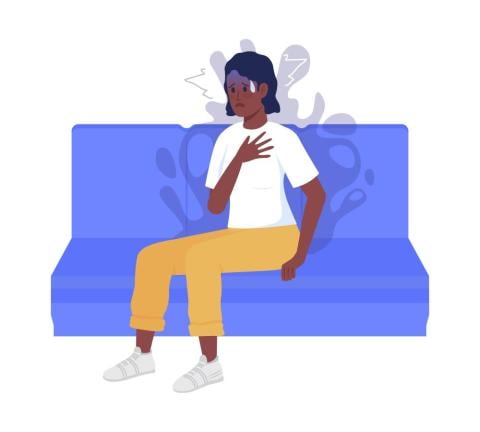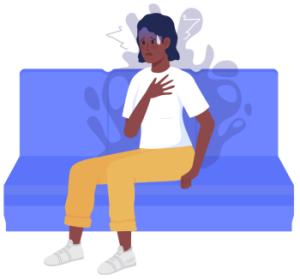Medication alone and psychotherapy (cognitive-behavioral therapy, interpersonal therapy) alone can relieve depressive symptoms. A combination of medication and psychotherapy has been associated with significantly higher rates of improvement in more severe, chronic, and complex presentations of depression.
- Pharmacological Treatment
- ADAA Medication Information Resources
- Can CBD Help with My Anxiety and Depression?
- Electroconvulsive Therapy (ECT)
- Psychotherapy
- Cognitive-Behavioral Therapy (CBT)
- Interpersonal Therapy (IPT)
- Discussing Medications: What You Need to Know
- Questions You Should Ask About a New Prescription
- Depression Looks Like Me Resources
- ADAA Resources
Pharmacological Treatment
Antidepressant medications work well to treat depression. Sometimes different antidepressant medications would have to be tried before finding the one that works best for the individual. Medications that have helped a close family member of the individual are likely to help the individual seeking treatment as well. Antidepressants usually take some time (2 to 4 weeks) before they impact the symptoms. Appetite, sleep and concentration typically improve before mood begins to lift. It is important for individuals receiving treatment to give the medication time before deciding that the medication is not working. Antidepressants can have side effects, but many side effects may lessen over time. Talking to a health care provider about the side effects and not discontinuing the antidepressant by oneself is important. Stopping the medication early when one starts feeling better is also not a good idea. Stopping the medication suddenly can cause unpleasant withdrawal symptoms and can be unsafe. It would be best to follow the prescribed course of time and then to stop the medication slowly and safely with the help of a health care provider.
Antidepressants are an effective modality of treatment. They may present risks to some individuals, especially children, teens, and young adults. Antidepressants are not usually prescribed in children and are not the first line of treatment in adolescents. Antidepressants may cause some people to have negative reactions when they first start taking the medication. Some may become agitated at first before it begins to work. Others may have suicidal thoughts or make suicide attempts. It is important for individuals taking antidepressants to be monitored closely, especially when they first start taking them. It should be kept in mind that for most people the risks of untreated depression far outweigh those of antidepressant medications when they are used under a doctor’s careful supervisionn.
ADAA Medication Information Resources
- Ketamine Fact Sheet - infographic
- The Meaning of Medications - Another Look at Complianc - Revisited - ADAA blog post
- A Most Difficult Decision - Medication and Pregnancy - ADAA blog post
- Psychotropic Medications: What You Should Ask Your Doctor - ADAA blog post
- For My Anxiety or Depression: Should I Use Medication or Therapy - ADAA webinar
- Medication for Anxiety: Benefits and Side Effects - ADAA webinar
- Depression: What You Need to Know About Medications - ADAA webinar
Psychotherapy
Cognitive Behavior Therapy and Interpersonal Therapy are evidence based psychotherapies that have been found to be effective in the treatment of depression.
Cognitive-Behavioral Therapy (CBT)
CBT is based on the premise that patients with depression have thinking that is characterized by dysfunctional negative views of oneself, one’s life experiences (and world in general) and one’s future – the cognitive triad. Thus, a clinically depressed person is likely to believe themselves as being incapable and helpless, to view others as being judgmental and critical and the future as being bleak and unrewarding. CBT is a structured and didactic form of therapy that focuses on helping individuals identify and modify maladaptive thinking and behavior patterns. There is research evidence supporting the effectiveness of CBT with individuals of all ages. It is also considered to be efficacious for the prevention of relapse.
Interpersonal therapy (IPT) is a time-limited treatment for major depressive disorder. It aims at reducing or eliminating depressive symptoms by improving the quality of the patient’s current interpersonal relations and social functioning.
Can CBD Help with My Anxiety and Depression?
Cannabidiol, or CBD, is a natural compound that has gained popularity in recent years. Currently, there is insufficient scientific evidence to support the claim that CBD is an effective treatment for depression or anxiety. That does not mean it would not help, but there simply haven’t been properly controlled clinical trials to support an indication of CBD for treating anxiety or depression. Considerably more research is required to evaluate CBD as a potential treatment for anxiety and depression.
Click here to read some frequently asked questions on CBD.
Electroconvulsive Therapy (ECT)
Electroconvulsive therapy (ECT) is useful for patients who are not responding well to medications or are suicidal. ECT is an effective treatment for patients who do not respond to drug therapy, are psychotic, or are suicidal or dangerous to themselves. Onset of action may be more rapid than that of drug treatments, with benefit often seen within 1 week of commencing treatment. The indications for the use of ECT include the following:
- Failure of drug therapies
- History of good response to ECT
- Patient preference
- High risk of suicide
- High risk of medical morbidity and mortality
Although advances in ECT treatment has improved the safety and tolerability of this modality there are some risks such as those associated with postictal confusion, and, more rarely, short-term memory difficulties.
Discussing Medications: What You Need to Know
Use these guidelines to talk to your health care professional about medications:
- To avoid potentially dangerous drug interactions, let your mental health care provider know all medications you are taking, including prescriptions and over-the-counter drugs, herbal or dietary supplements, and vitamins. And make sure your family doctor knows you are taking medications for an anxiety disorder.
- Learn when to take a new medication and how, such as on any empty stomach or with food, in the morning or evening, and how frequently.
- Find out how long it should take for the medication to start working and what you should expect when this happens.
- Ask for the prescribing physician’s after-hours phone number in case you develop side effects.
- A good source of information about medications and over-the-counter products is your pharmacist, who should have information about all your prescriptions to advise you about possible drug interactions, side effects, and instructions for use.
If your physician does not want to spend the time to answer your questions, you may need a referral to a different physician.
Questions You Should Ask About a New Prescription
- How will the medication help me? What side effects might occur? Should I avoid any foods or beverages? Are drug interactions with other prescriptions a possibility?
- How often you should see the doctor for a medication check-up?
- Is this new drug/treatment appropriate for me?
- What might be the benefits over my current regimen?
- Is the price (typically high when a drug is new) worth the added benefit?
- What are the drawbacks, if any of this new treatment?
- Is this treatment ready for widespread use? Meaning, does it have safety established, do we know how long people need to be on this treatment?
- Do we know about any long term issues that could result from this?
ADAA Resources
- Depression brochure
- Join ADAA's free peer to peer Major Depressive Disorder (MDD) online support group
Blog Posts
- How to Navigate the Transition to a New Therapist
- What to Do to Fight the Isolation You Feel When You’re in Distress
- What to Do When a Friend Discloses Their Struggles With Mental Health
- Mental Health Resources for Suicide Survivors
- Influences of Cultural Differences in the Diagnosis and Treatment of Anxiety and Depression
- 7 Ways to Seek Therapy Without Breaking the Bank
- How Do You Talk to Your Loved One Suffering With Depression?
- Criticism: Depression and Anxiety
Webinars
- Depression: How to Recognize and How to Treat It
- Depresión y ansiedad en niños/Anxiety and Depression in Children - Spanish psychoeducational video
- The Effects of Racism on Mental Health: How to Cope
- Depression Among College Students
- Depression and Heart Disease: Chicken and the Egg, and What You Can Do
- For My Anxiety or Depression: Should I Use Medication or Therapy?
- How to Help Depressed and Suicidal Teenagers
Depression Looks Like Me Resources
Page content was reviewed and updated in October 2020 by ADAA member Paul Greene, PhD
1. https://www.nimh.nih.gov/health/publications/depression/index.shtml#pub1
2. https://www.nimh.nih.gov/health/statistics/prevalence/major-depression-among-adults.shtml
3. American Psychiatric Association. (2013). Diagnostic and statistical manual of mental disorders (5th ed.). Arlington, VA: American Psychiatric Publishing.
4. Sadock, B. J., Sadock, V. A., & Ruiz, P. (2009). Comprehensive Textbook of Psychiatry (Ninth edition.) Philadelphia: Wolters Kluwer.
















